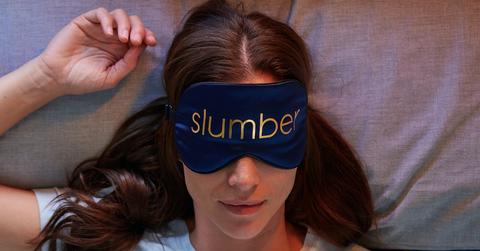
Rest Easy! 7 Reasons Sleep Is Key To Your Health
May 5 2022, Published 4:00 p.m. ET
We drink water when we are thirsty and eat food when we are hungry. Yet, sleep seems like the one dispensable thing we can sacrifice and put off when pressed for time.
Sleep is one of the most necessary things we need to do to have a healthy body, and depriving yourself has fatal implications on every aspect of your life. But before we discuss how sleep impacts your health and discuss some ways you can sleep better, you need to know the mechanics of sleep. Let's unpack how sleep works.
What is the Science Behind Sleep?
Everyone has an internal body clock that operates on a 24-hour cycle known as the circadian rhythm. This controls feelings of refreshment in the morning and progressive tiredness throughout the day. The brain produces an organic compound called adenosine, which increases throughout the day, inducing feelings of tiredness. This compound is finally broken down during sleep.
Light also affects the circadian rhythm. When your eyes are exposed to natural or artificial light, a signal is sent to the brain, which helps it determine whether it is night or day. If it is daytime, your body will produce cortisol, a hormone that promotes energy and alertness. As light naturally disappears in the evening, the body releases melatonin, which induces drowsiness.
Sleep occurs in 4 stages, which make up one complete sleep cycle. These are three stages of NREM (non-rapid eye movement) sleep and one cycle of REM (rapid eye movement) sleep.
Heartbeat, breathing, muscle tension and brain wave activity progressively relax during the NREM stages and increase during the REM stage when people start dreaming. Each sleep cycle lasts for about 90-120 minutes. Adults usually go through 4 to 5 sleep cycles during a full night’s sleep.
Here is a list of sleep requirements for people based on their age:
●0-3 months (newborns): 14-17 hours
●4-11 months (infants):12-15 hours
●1-2 years (toddlers):11-14 hours
●3-5 years (preschoolers): 10-13 hours
●6-13 years (school children): 9-11 hours
●14-17 years (teenagers):8-10 hours
●18-25 years (young adults):7-9 hours
●26-64 years (adults): 7-9 hours
●65+ years (older adults): 7-8 hours
Now that you have all the essential information about what goes on in your body as you sleep, let's explore some remarkable ways sleep benefits you every day.
7 Reasons Why You Need To Sleep
Enhance Brain Activity
After a good night’s rest, we wake up feeling refreshed, clear-headed and alert. This makes it easier to learn new things, solve problems, make decisions and recall memories. Good sleep positively impacts our cognition, concentration, productivity and performance.
On the other hand, if we don’t get as much sleep, we are usually groggy and slow to react. This means regular activities like learning, recalling details, and concentrating on tasks become challenging for us. Extreme cases of chronic sleep loss may even lead to fatal accidents on the road.
According to research studies, it is proven that:
●When we sleep, the brain reorganizes and recharges itself. Sleep improves memory recall, reduces mental fatigue and is essential for proper cognitive and behavioral function.
●Toxic byproducts accumulate in the brain throughout the day and are removed during sleep. If we don’t get enough sleep, these toxins can build up, impairing our cognitive abilities, behavior and judgment.
●Prolonged sleep deprivation can lead to permanent loss of brain cells and consequent brain damage.
So, make sure you get enough shut-eye every night to give your mind the chance to rest and recover. After all, you always want your brain to be functioning properly.

Boost Energy
Alongside your mind, your body needs some rest too. When your body gets adequate sleep, you wake up feeling rejuvenated and motivated to take on whatever the day has in store. Sleep helps repair tissues and generate new cells within the body. This improves your overall strength and energy levels.
Sleep helps with hand-eye coordination, motor skills, reaction time, muscle repair, muscular power and endurance. If you don’t get enough sleep, your risk of injury increases — and your motivation to exercise decreases.
Although the process of energy production during sleep is quite complex, two phenomena that contribute to it are:
●Sleep Cycle Effect - Studies show that the body renews and repairs itself during the third stage of NREM sleep, also known as deep sleep or slow-wave sleep. During this stage, the body’s ability to make ATP (energy molecule) is enhanced. A pulse of growth hormone is released by the pituitary gland which stimulates tissue growth and muscle repair.
●Chemical Effect - According to sleep specialists, two chemicals, glycogen, and adenosine, help conserve and restore energy during sleep. Glycogen, which stores energy in the brain, increases when we are asleep. Adenosine works during waking hours and promotes sleepiness. The two chemicals work in tandem — adenosine build-up helps us fall asleep and glycogen build-up during sleep helps restore lost energy.
Improve Metabolism and Control Weight
Sleep is intimately linked with how your body metabolizes food, which determines your appetite. If you don’t get enough sleep, you tend to eat more while awake. Insufficient sleep has been linked with weight gain and obesity, so starting weight-loss diets without getting enough sleep is futile.
Medical studies show that healthy sleep equates to the healthy production of appetite hormones like leptin and ghrelin. Ghrelin boosts appetite while leptin hinders feelings of hunger by telling you you’re full. The two hormones counteract each other to maintain a healthy metabolism. Without adequate sleep, ghrelin levels increase and leptin levels decrease, leading to feelings of hunger during the day.
To make up for the lack of energy due to insufficient sleep, you will naturally gravitate towards high-calorie foods. Without the inhibition produced by leptin, you won’t be able to resist the temptation of junk foods. You are also less likely to exercise due to a lack of energy. Altogether, you are at risk of colossal weight gain. The only way to improve your metabolism is by developing healthy eating habits and getting adequate sleep.
Control Risk of Diabetes
Your metabolism and insulin production is tied in a knot. Obesity is a common precursor to diabetes. If your metabolism goes awry, it directly affects how your body reacts to insulin production. People who sleep less than five hours per night are much more likely to have or develop type 2 diabetes.
Insulin, the hormone that regulates blood sugar levels by using glucose to produce energy, operates during deep sleep. Thus, in this stage, the amount of glucose in your blood drops. If you don’t get enough time in the deep sleep stage your body will be unable to respond to your cells' needs and react well to insulin, causing insulin resistance.
When cells fail to use this hormone efficiently, the glucose is not broken down. So your blood sugar levels may increase drastically. This is what puts you at a higher risk for type 2 diabetes.

Promote Immune Health
Sufficient sleep is necessary to maintain a healthy immune system, without which you won’t be able to resist infections. Similarly, strong immunity contributes to better health and therefore better sleep. The relationship between sleep and immunity is symbiotic. Sleep-deprived people are more likely to get sick and take longer to recover as well.
While you are asleep, the immune system releases proteins called cytokines, which fight infection and help your body deal with stress. Lack of sleep decreases the production of these protective cytokines along with infection-fighting antibodies. So the less you sleep the more susceptible you are to infectious diseases. Fragmented sleep also increases the levels of inflammatory cytokines, which contribute to cardiovascular and metabolic disorders. So you develop new diseases when you don’t sleep well.
Sleep helps the immune system repair, regenerate, and recover, much like any other part of the body. It can also make vaccines work more effectively. Sleep is necessary, along with a healthy diet, to keep you hearty and fight off diseases.
Ward Off Heart Diseases
Sleep deprivation and disturbances have a massive negative impact on blood pressure and heart health. It can lead to chronic problems like high blood pressure, high cholesterol, coronary heart disease, irregular heartbeat, heart attack and stroke.
Sleep is the time when your body recuperates. During the NREM stages of sleep, breathing stabilizes, blood pressure drops and heart rate slows down. Blood pressure drops by around 10-20 percent, which is known as nocturnal dipping. It helps reduce stress on the heart and allows it to recover from daytime strain.
Due to lack of sleep, blood pressure doesn’t go down at night. This maintained or elevated nighttime blood pressure is related to hypertension. It causes major heart problems. Fragmented sleep can also lead to the release of cortisol, a stress hormone. It triggers your heart to work harder, further putting it under strain. Sleeping at least seven hours is mandatory for promoting better heart health.
Regulate Emotions and Mental Health
Two of the core areas where our mood and emotions matter are how we behave with others and how we feel about ourselves. Sleep affects both areas.
Have you ever woken up feeling cranky? That's because poor and inadequate sleep makes you irritable and stressed, while healthy sleep promotes a better mood. When you are well-rested, you won’t be as easily annoyed. You will have the patience to manage people and situations better. This can greatly improve your relationships.
Bad sleeping habits can induce temper tantrums, mood swings, emotional outbursts, inability to respond to humor, and lack of empathy. It hampers your emotional and social intelligence, which are necessary for recognizing others’ emotions. By prioritizing your sleep, you make an effort towards building better relationships with people and being more social.
If you’ve ever faced a tough situation and someone advised you to “sleep on it," they were right. Sleep gives your brain the chance to refresh your point of view about life so that you can process your emotions and react positively. Negative emotional reactions are often a result of inadequate rest and unregulated emotions.
Chronically sleep-deprived people experience loneliness since they tend to withdraw from social events. In fact, insomnia may lead to mood disorders like anxiety and depression. These conditions also contribute to insomnia. Simply taking medications or eating foods that ease your anxiety are not enough. You need healthy, regular sleep to combat these conditions and seek professional help when required.
Tips To Help You Get Better Sleep
Now that you are aware of the ways sleep is beneficial for your health, let’s focus on some habits you can develop to sleep better.
●Pick out comfortable bedding. High-quality bedding and sheets keep you physically comfy, which makes it easy to doze off.
●Maintain a regular bedtime. Stop going to bed at a different time every day, and instead find a realistic bedtime that you can stick to, every night.
●Stay away from screens an hour before going to bed. The blue light from TV, computer, and mobile screens interfere with your circadian rhythm, making it difficult to fall asleep.
●Have a night-time routine to wind down. Before you hit the hay every night, you can meditate, take a bath, or do a skincare routine that signals to your brain that it’s time to shut down.
●Exercise during the day. Physical activity, be it going to the gym or walking in the park, tires out your body enough to fall asleep the moment you close your eyes.
●Refrain from alcohol, tobacco and coffee. Nicotine and caffeine are stimulants whose effects can last for up to eight hours. Alcohol degrades sleep quality, exacerbating the symptoms of insomnia and sleep apnea.
●Ensure a no-disturbance bedroom environment. Darkness, optimal temperature, and silence are necessary to ensure that your sleep isn’t fragmented.
While the consequences of poor sleep are dangerous, those of good sleep are equally rewarding. As long as you follow the tips given above, getting a good seven to eight hours of healthy, regular sleep should be a piece of cake — and you’ll start seeing its results immediately!
